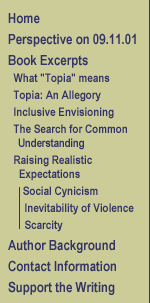
|
The Politics of Universal Compassion |
It
is sometimes assumed that either human nature or a set of permanent or
relatively permanent socioeconomic conditions predetermine an upper limit
to the potential social level of compassion and social concord--within
nations and between nations, and in the world as a whole. This chapter
challenges some of these assumptions, and argues that the potential degree
of compassion reflected in the global polity is not determined by the
level of compassion at present or in the past.
In the excerpts linked below, I will examine and respond to certain commonly
held ways of conceiving human nature and society that limit the potential
for envisioning and realizing compassion on a more universal scale. Such
conceptions tend to hinder the flow of logic and action in the direction
of universal compassion. I will review several of these conceptions, beliefs
and mindsets and respond to them.
Specifically, three beliefs or social conceptions that need to be challenged and overcome for universal compassion to be more fully conceived and realized are: (1) cynicism about the potential for significant social change; (2) a belief in scarcity, that there are insufficient resources available to satisfy everyone's basic needs; and (3) a belief in the inevitability of violence. Each of these beliefs will be examined below.
What is Realistic?
By way
of introduction, it will be helpful to reflect on the role of political
beliefs in creating social reality, and thus in enabling or limiting the
potential for social change.
We live in a world that we have created. Society and politics are entirely
a human creation. The present is determined to a great degree by adherence
to the habits of the past. If we trace each present-day social norm or
institution--whether religious, political, or cultural--to its historical
origins, some of which occurred near the beginning of human history, we
find that each is based on choices made by individual human beings. These
choices of values, beliefs, logic structures and institutional and cultural
norms are often institutionalized through their unconscious acceptance
by those who receive them uncritically. By accepting the norms and social
structures of the world, and by acting within them, we reproduce and reinforce
those norms and social structures on a daily basis. But it is important
to recognize that these norms were created and chosen at some earlier
point in history and thus can be either re-chosen or abandoned in favor
of better ones.
The political world is based on a set of beliefs, ideas and values--and
on a logic structure organizing them into a relatively coherent whole.
However, if we change the logic structure--and act on the new logic--we
can change politics. Fully recognizing that social reality is socially
constructed is liberating, because it implies that what we have created
we can change and transform.
Part
of the changeable logic structure of any given society--including global
society--are what sociologist Alvin Gouldner, has called "background
assumptions,' the "unpostulated and unlabeled" assumptions that underlie
our conceptions of society. He labels these "background assumptions" because
"they provide the background out of which the postulations in part emerge
and, on the other hand, not being expressly formulated, they remain the
background of the (people)'s attention." The background assumptions of
a concept of social reality include theories of cosmology, physics and
metaphysics, human nature and society, logic and justice, and so on. Background
assumptions contribute in a large way to the acceptance or rejection of
a social theory by its hearers or readers. A "social theory," he writes,
" is more likely to be accepted by those who share the theory's background
assumptions and find them agreeable." (Gouldner, 1970: 29)
Such fundamental and "obvious" assumptions that define our worldview are
sometimes quite difficult to analyze--or even to name--because they do
not always appear in the form of political or philosophical arguments.
Rather, they are more aptly characterized as a social mood or ethos than
a political argument or philosophy. They take the form of unnamed, amorphous,
undefined limits on our sense of possibility and reality that obscure
our ability to see beyond them.
Such beliefs and assumptions have a very powerful effect on those who
hold them. How we think about the world can either limit or promote our
ability to create social change in a number of ways. Beliefs influence
(1) how we perceive the world; (2) how we feel about the world; and (3)
how or whether we take action in the world to create change.
Limiting Beliefs and Universal Compassion
There are many beliefs about the nature of human beings and society that limit individual and collective initiative toward universal compassion. Three such beliefs will be addressed below: social cynicsm, the belief in the inevitability of violence, and a belief in scarcity of resources. It will be argued that currently-prevalent social cynicism is a choice along a social optimism-pessimism continuum and represents more a social mood than an accurate perception of social reality; that current levels of violence are not inevitable and can potentially be drastically reduced; and that scarcity is a social convention rather than a social reality. By helping to challenge limiting beliefs and social assumptions, it is hoped that these excerpts will encourage those who wish to work for the realization of universal compassion. Only when people believe that something is possible will they strive for it.
Click on the links below to read responses to these attitudes and beliefs.
|
|
|
|
|
|
|
|
|
© 2002 Joel Federman